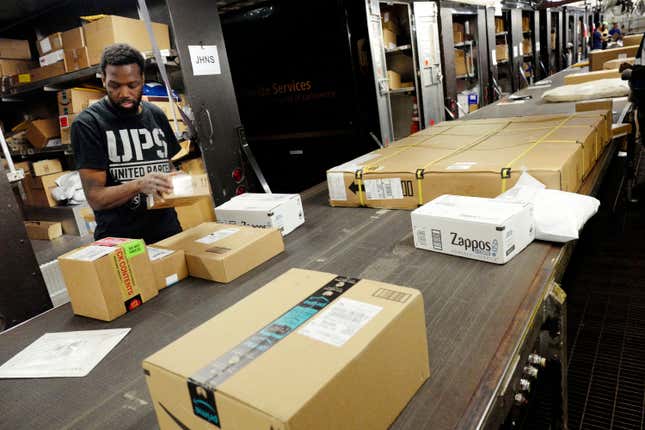
In one of those “Wait, you mean they didn’t do that 50 years ago?” news items, UPS has announced its workers can finally have facial hair and wear their hair in a number of hairstyles. For Black folks, this means afros, braids, and other protective styles can finally be worn with the iconic brown uniform.
The news was first reported by the Wall Street Journal on Tuesday evening. Along with the new grooming guidelines, the delivery giant is also getting rid of gender-specific restrictions on appearance, emphasizing professionalism without rigid rules.
“No matter how you identify—dress appropriately for your workday,” the new policy states. The guidelines also explicitly permit natural hairstyles “such as Afros, braids, curls, coils, locs, twists and knots.”
The changes are partly attributed to UPS’ new chief executive, Carol Tomé, who became the company’s first female CEO in March. UPS said Tomé “listened to feedback from employees and heard that changes in this area would make them more likely to recommend UPS as an employer.”
Seeing the UPS delivery person arrive at your door is a not-so-secret joy for many of us out there, especially during the holiday season (Merry Christmas to me, indeed!) Had I known illustrious beards and long, flowing locs were banned, I might have called up Ms. Tomé my damn self.
Previously, UPS, which employs more than 525,000 people worldwide, enforced a stringent, “military-like” policy when it came to appearance, the WSJ writes. For most of the company’s 113-year history, sideburns were not allowed to extend past the ear canal and mustaches were to be trimmed so they would not touch the crease of the lip.
This, of course, was wildly discriminatory and prompted grievances from the Teamsters union, as well as a lawsuit filed by the U.S. Equal Employment Opportunity Commission because the policies effectively kept Muslims, Sikhs, Rastafarians, and other religious minorities from being hired or promoted by the company. In 2018, UPS settled the suit for $4.9 million. It also allowed workers to grow a beard—so long as they received a medical or religious exemption.
The Journal notes that some local workplaces permitted drivers to get “shaver waivers” without much hassle. And, as with any workplace, just because the guidelines exist doesn’t mean they were universally or equitably applied.
While UPS held onto its stringent policy, many other institutions began relaxing theirs as they came to terms with implicit and explicit messages of such guidelines. By restricting hairstyles, particularly natural and protective styles for Black workers, such restrictions communicated that Black hair was “inherently unprofessional,” Angela Onwuachi-Willig, a professor of law and dean of the Boston University School of Law, told the New York Times.
For this reason, a number of states have outlawed discriminating against someone on the basis of their hairstyle or hair texture. Last year, California became the first state in the country to pass the CROWN Act, an acronym that stands for “Create a Respectful and Open Workplace for Natural Hair.” New York and New Jersey followed suit with their own versions of the law, and the U.S. House passed a federal version of the legislation this past September.
UPS’s new policy comes as its services are in greater demand. Just in the last several months, the coronavirus pandemic has led to a 13.5 increase in the volume of packages the company delivers, compared to its rate from the same period in 2019. And with the virus surging across the United States, that number will likely increase over the busy holiday season.
Ending its nonsensical ban on beards and natural hairstyles will likely allow the shipping company to scale up its workforce during a crucial time. According to CNN Business, UPS hired 39,000 permanent new employees as COVID rates began spiking earlier this year, and plans to hire another 100,000 additional seasonal employees in the coming weeks.



